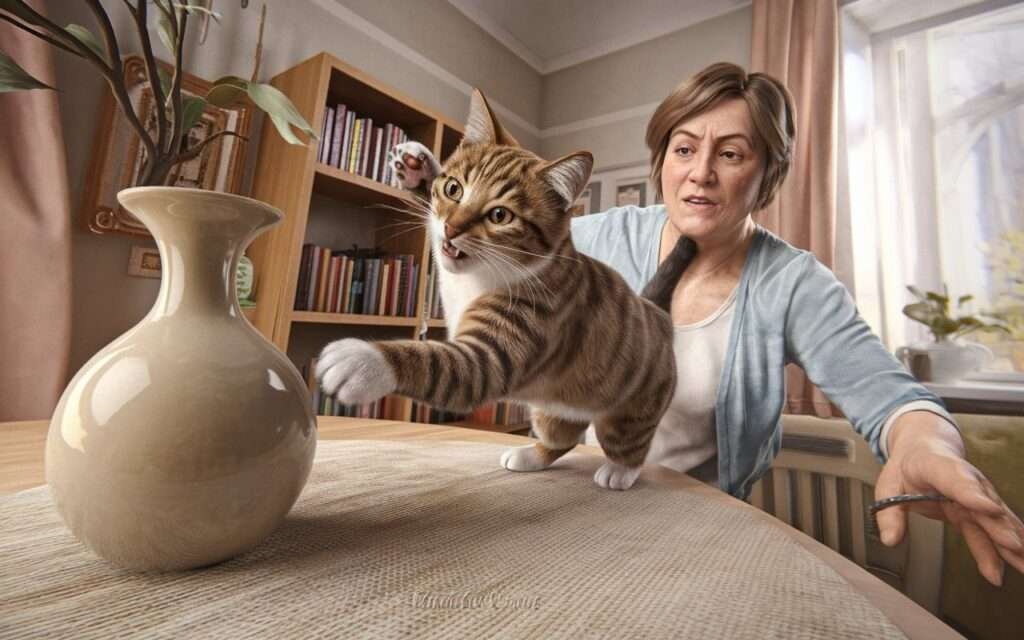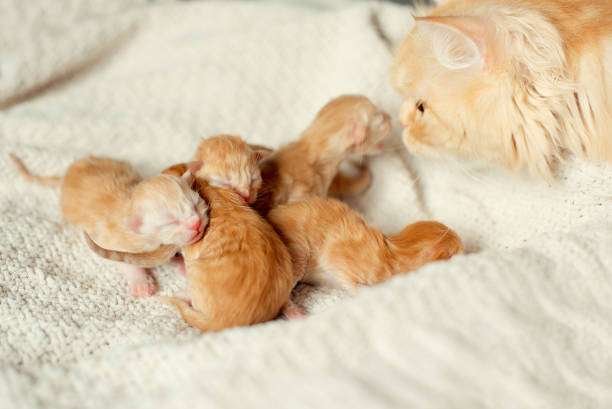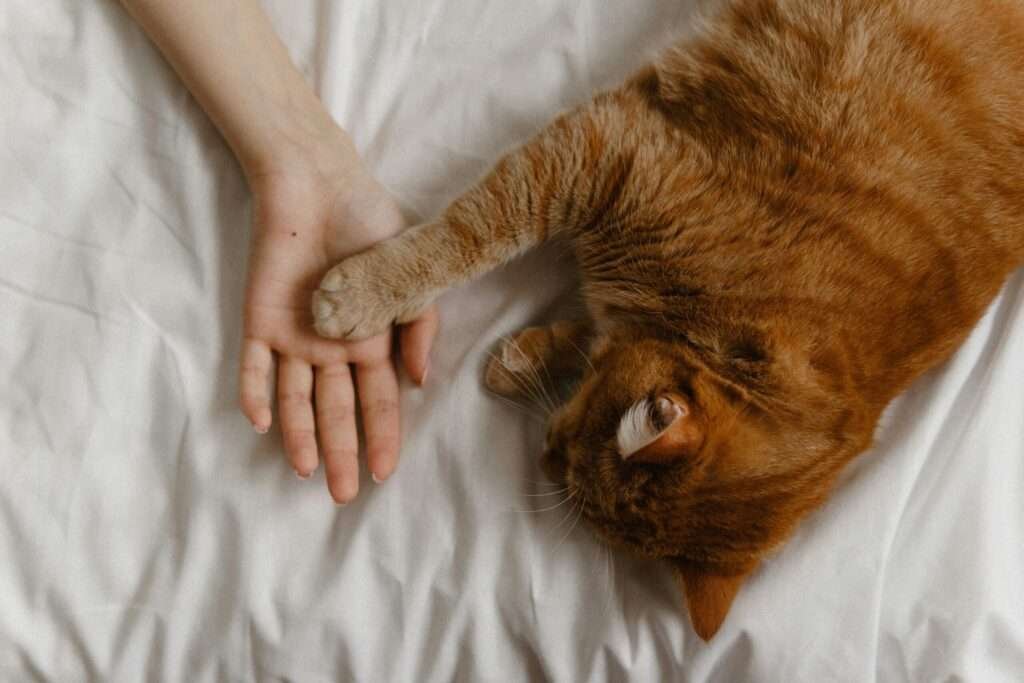Table of Contents
ToggleWhy Do Cats Knock Things Over? Understanding the Behavior and Managing It
For cat owners, the sound of a cherished vase crashing to the ground or a stack of papers scattering across the floor may be an all too familiar occurrence. The perplexing behavior of knocking things over is a common quirk exhibited by many cats, leaving owners puzzled and sometimes frustrated. But why do cats engage in this seemingly mischievous behavior, and what motivates them to knock objects off surfaces?

Natural Instincts
Cats are instinctual hunters, and this behavior often stems from their innate prey drive. Imagine that paperweight on your desk were a mouse; your cat would naturally investigate it, batting it around to gauge its interest or potential as prey. This instinct remains strong even for indoor cats who’ve never encountered a mouse.
The origins of this destructive habit likely derive from a cat’s sense of curiosity and their natural hunting instincts. Cats, as skilled predators, use their paws to capture and manipulate prey. When they see objects balancing precariously on edges or ledges, they may view them as potential prey and instinctively attempt to hunt or capture them by swatting or batting them with their paws.

Seeking Attention
Another reason behind this behavior is seeking your attention. Cats quickly learn that knocking objects over elicits a response from their owners, whether positive (like receiving food) or negative (such as being scolded). This is a common way for cats to garner attention and elicit a response from their humans. They may learn through experience that engaging in this behavior results in their owner providing attention, thus reinforcing the behavior.
Redirecting attention to positive interactions like grooming or playtime can help diminish this behavior. Spending time with your kitty, giving them plenty of chin scratches, playing fetch, and brushing can provide the attention they seek in more constructive ways. When your cat does knock something over, avoid reacting to reinforce the behavior. Instead, calmly manage the situation without engaging with your cat directly.

Curiosity and Exploration
Cats are naturally curious creatures. Any change in their environment, from new objects to rearranged furniture, triggers their curiosity. Exploring and swatting objects becomes a form of mental stimulation and entertainment for them. Providing a variety of toys and rotating them regularly can keep them engaged and less interested in your desk items.
Cats are drawn to investigate and interact with their surroundings. When they encounter objects perched on shelves, tables, or countertops, their instinct is to explore and manipulate them using their paws and claws. Knocking things over allows cats to satisfy their curiosity and engage in tactile exploration. The act of knocking objects around provides sensory feedback and engages their senses, helping alleviate boredom and restlessness.

Boredom and Stimulation
Cats are intelligent and active animals that require mental and physical stimulation to thrive. In environments lacking sufficient enrichment or opportunities for play, cats may resort to knocking things over as a form of entertainment and stimulation. The act of knocking objects around provides sensory feedback and engages their senses, helping alleviate boredom and restlessness.

Pet-Proofing Your Home
To mitigate risks, ensure potentially hazardous items like sharp or fragile objects are secure. Sturdy containers for houseplants and strategic placement of items can minimize the risk of accidents. Cats are notorious for jumping up on counters, and this can be especially dangerous in the kitchen. Make it a habit to put things away when you are finished using them. Broken dishes and sharp utensils can easily end up on the floor in households with cats.
Bathroom counters also pose a danger if you leave the tops off of pill bottles and cosmetics. The last thing you want is for your kitty to ingest a pill or some perfume that could poison them. Nothing you do will totally keep your cat from knocking things over, but pet-proofing your home can help make it safer for your cat.
Territory Marking
Cats are territorial creatures that use scent and physical markings to establish and maintain their territory. Knocking things over may serve as a form of territorial marking, as cats leave behind visual and tactile evidence of their presence by displacing objects or rearranging their surroundings. Cats may be asserting their ownership and marking their territory with their scent.

Communication
Knocking things over can also be a form of communication for cats, signaling their emotions or needs to their owners. Cats may knock objects over to express frustration, anxiety, or a desire for attention or resources. Understanding the context and triggers for this behavior can provide valuable insights into your cat’s emotional state and preferences.
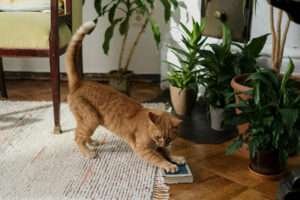
Play and Predatory Behavior
For some cats, knocking things over may simply be a form of play or predatory behavior. They may enjoy the physical challenge and stimulation of batting objects around and watching them fall. This behavior satisfies their natural instincts to hunt and capture prey, even if the prey in question is an inanimate object.
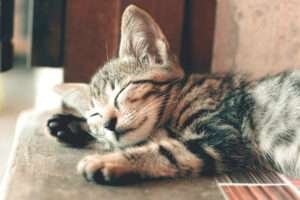
Managing the Behavior
While the behavior of knocking things over may be perplexing to cat owners, it’s essential to recognize that it often stems from natural instincts, curiosity, and the need for stimulation. By providing appropriate outlets for play, enrichment, and attention, cat owners can help redirect this behavior in more constructive ways while fostering a harmonious relationship with their feline companions.
Indoor cats who can’t explore the great outdoors to satisfy their innate curiosity get bored. According to Dr. Murty, it would make sense to schedule regular playtime using moving objects. This way, your cat can count on having your full attention for a period of time each day. Plus, it’s entertaining and fun. Make sure your cat has things to keep them busy and occupied. The idea is to try and combat their boredom with plenty of toys, treats, food puzzles, and a place to perch in a window so they can watch the birds, squirrels, and other outdoor critters.
FAQ: Why Do Cats Knock Things Over?
Q: Why do cats knock things over?
A: Cats knock things over because they are curious.
Q: Do cats knock things over for attention?
A: Yes, sometimes cats do it to get your attention.
Q: Is knocking things over a natural behavior for cats?
A: Yes, it is a natural behavior for cats.
Q: Can cats knocking things over be a sign of boredom?
A: Yes, cats might do it when they are bored.
Q: Do cats knock things over because they are playful?
A: Yes, cats often knock things over when they are playing.
Q: Can a cat’s hunting instinct cause it to knock things over?
A: Yes, their hunting instinct can make them knock things over.
Q: Is it possible to stop cats from knocking things over?
A: Yes, you can try to stop them with training and providing toys.
Q: Do all cats knock things over?
A: Not all cats do, but many cats do.
Q: Can knocking things over be a sign of stress in cats?
A: Yes, it can sometimes be a sign of stress.
Q: Should I be worried if my cat knocks things over?
A: Usually, it’s not a problem, but if it happens a lot, you might want to check with a vet.

